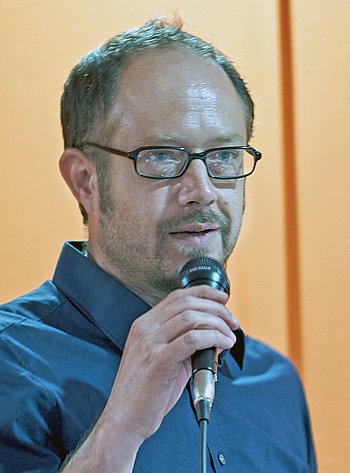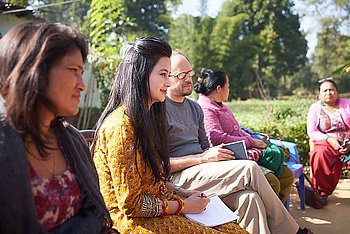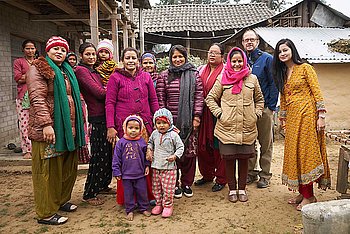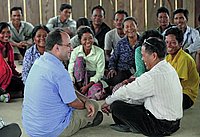Interview: Experiences in the Civil peace service
„For me, it was a very rich and valuable time overall"

Chris Hartmann spent four-and-a-half years with EIRENE in Nepal, where he coordinated civil peace service projects for Kurve Wustrow. His work involved dealing with the consequences of civil war, peace work, and conflict analysis, and focused mainly on projects for women who had been victims of violence, especially sexualised violence. His work for and with young people involved implementing a variety of preventive measures to protect young people from exploitation by criminal gangs and political parties and from being drawn into violent conflict.
Chris Hartmann now lives in Osnabrück, where he works for Terre des Hommes.
Mr. Hartmann, you worked in Nepal for more than four years as a professional civil peace service worker. What led you to become interested in development cooperation?
I already became interested when I was at school. I’m a geographer and geography was one of my main subjects at school. At some point, we covered the topic of "developing countries". I saw then how very unfair the world is. And that upset me a lot. So I already started doing voluntary work as a school student. Later, I also took part in a workcamp in Zimbabwe. And when I was studying geography, I chose "developing countries" as the main subject of my research.

Besides wanting to work for greater justice, were there other things that motivated you to go and work in Nepal?
I’d already completed a training course in "civil conflict management". And then I applied to be a professional civil peace service worker, because I wanted to put things into practice, so to speak, and in the process to gain insights into peace work in the field.
So thoughts about my professional career were also part of my motivation, but certainly not in terms of "climbing the career ladder", but rather in terms of "gaining professional experience and making new observations” which would be useful to me in my work. I was also interested in taking on new professional roles that were different from those that I’d had in Germany. I’d never had a coordinating role before and that was also something that attracted me.
Is it your impression that the experience and skills that you brought back with you from your civil peace service are in demand in the German job market?
During my civil peace service, I was able to further develop several skills – but only informally, so I don’t have any certificates to show people. Some of these kinds of experience are becoming increasingly important – and therefore valued – in the world of work: intercultural experience and mediation and conflict resolution skills, for example. I know of situations in refugee work and community conflict management, where such skills and experience are in great demand.
By the way, I found the courses and other services that AGdD has to offer, such as the ProfilPASS, very helpful in this context. They enabled me to reflect thoroughly on my skills once again. That really helped me a lot with reorienting myself after my return.
So how did your return to Germany work out in terms of your professional career?
When I returned to Germany from Nepal, I went back to where I’d lived before, to Osnabrück, partly because I found work there. I’d already worked for Terre des Hommes there before and I was able to go back to that after my time in Nepal.
The experience that I’d gained in Nepal proved to be very useful. So, jobwise, it was a smooth transition, because I already had the new employment contract in my bag when I returned. But finding somewhere to live was a major challenge. During my absence rents had shot up alarmingly.
So you are continuing to work professionally in the field of international development cooperation. Are you still active in this field outside your work as well?
Yes, I’m now serving, unpaid, on the board of Kurve Wustrow, having worked in their projects in Nepal. This includes the usual board meetings and then I also accompany decision-making processes if the management asks me to. I can easily afford the limited amount of time that I need to spend on this activity and the involvement is really important to me alongside my job, which is also very demanding.
So how would you rate the four-and-a-half years of civil peace service? Do you sometimes feel kind of homesick for Nepal?
Yes, I miss Nepal and the people I worked with there. But Terre des Hommes also has projects in Nepal, so I can keep in touch through my current work. I could also well imagine going abroad as a professional development worker once again – preferably on shorter assignments, where the work is more focused.
All in all, it was a very rich and valuable time for me. I met a lot of competent people and was able to broaden my horizons considerably. I experienced my four-and-a-half years in Nepal as a time of mutual learning. This is what I particularly like about the role of a professional development service worker or civil peace service worker, even though the approach can sometimes be a bit too paternalistic. I would like to see more in terms of South-South and South-North exchanges.
The interview was conducted as part of the AGdD Tracer Study 2022 for the publication "Die Welt im Gepäck. Returned professionals from the development service in the years 2011-2022". The interview was conducted by Dieter Kroppenberg.



